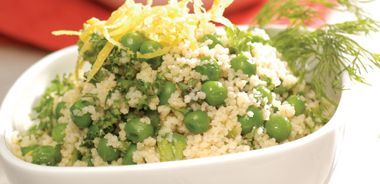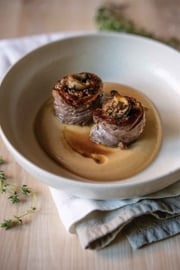Rooibos Chickpea Couscous

Rooibos tea is actually a herbal tea so it’s low in tannins and has no caffeine. This means the tea is never bitter, no matter how long it is brewed. This also means rooibos is ideal for cooking and can be used in soups, stews, and anywhere water would be used. Simply replace the water with an equivalent amount of rooibos tea for an increase in antioxidants and minerals such as calcium and magnesium. Because rooibos is caffeine free, you won’t be kept up into the wee hours.
This recipe calls for a green rooibos variety. Like black tea, rooibos can be picked and dried immediately, resulting in a green rooibos that is higher in antioxidants. Alternatively it can be fermented, which is the traditional method, and this creates the “red” rooibos tea. Both types are suitable for this recipe, which can be served warm or chilled.
1 1/2 cups (385 mL) green rooibos tea, brewed and hot
1 cup (250 mL) whole wheat couscous
1 1/2 cups (385 mL) fresh peas or tomatoes, diced
2 cups (500 mL) canned chickpeas, drained
1/2 cup (125 mL) parsley, chopped
2 Tbsp (30 mL) fresh mint, chopped
2 Tbsp (30 mL) fresh basil, chopped
1 Tbsp (15 mL) extra virgin olive oil
1 tsp (5 mL) fresh lemon zest, chopped
1 tsp (5 mL) sea salt
1 tsp (5 mL) freshly ground black pepper
In a large steel or tempered glass bowl, combine hot tea and couscous. Stir and cover for 10 minutes. Lightly steam fresh peas (if using). Fluff couscous with a fork and add peas (or tomatoes), chickpeas, parsley, mint, basil, olive oil, lemon zest, salt, and pepper. Toss lightly and serve. Serves 4.
source: "Longevi-tea", alive #271, May 2005




